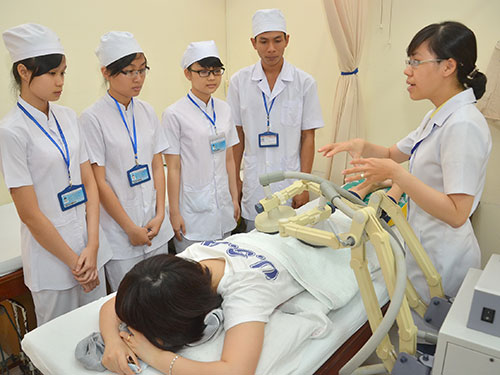Education Ministry vows to keep keen eye on medical schools
The Ministry of Education and Training (MOET) has decided to tighten control over medical training as experts have repeatedly rung the alarm bell over the quality of new medical school graduates.
MOET said the ministry has stopped considering plans by multidisciplinary schools not specialized in medical and pharmaceutical training to open more training majors in general practice, dentomaxillofacial, traditional medicine (for university – 6-year training, and junior college – 3-year training - degrees), and pharmacology (for junior degree).
A report showed that about 20 schools nationwide train general practitioners, 23 schools train pharmacists at university level, and 41 schools provide training in pharmaceutics and nursing. These include people-founded schools, the training establishments which are believed to be inferior to state-owned schools because they enroll students that had low scores on the national university entrance exams.
 |
“The quality of students of many people-founded universities is really alarming,” an official of MOET commented.
“Many schools only set the minimum required exam marks equal to, or just a little higher than the floor marks. Meanwhile, medical students must be the best ones,” he said.
The floor marks are the minimum mark that students must have from the national university entrance exams to be eligible to apply to any university in Viet Nam.
In the 2013-2014 academic year, for example, Dai Nam University accepted students, who got 15/30 marks only from the national exam, for pharmacology training. The Lac Hong University set a low minimum mark at 14-15.
In a dispatch to MOET, Deputy Minister of Health Le Quang Cuong, while complaining about the low qualification of medical school graduates, pointed out that it was unreasonable to allow local education departments to license medical training projects.
Experts also voiced concern about the training quality of non-state owned schools, which have limited training capability. They also noted that with the low-quality students, schools will not be able to produce graduates with high qualifications.
Dr. Hoang Bui Hai, a lecturer at the Ha Noi Medical University, said medical schools must be very demanding to be able to select the best students.
“Opening medical schools must not be as easy as opening business schools,” he noted.
Dr. Le Quan Nghiem, vice president of the HCM City Medical and Pharmaceutical University, has urged MOET to set higher conditions for medical training.
Under current laws, schools just need to have one PhD and three masters to be eligible to apply to offer medical training.
Nghiem also thinks that local education departments do not have deep knowledge about the specific field, and thus, should not be assigned to grant licenses to schools.